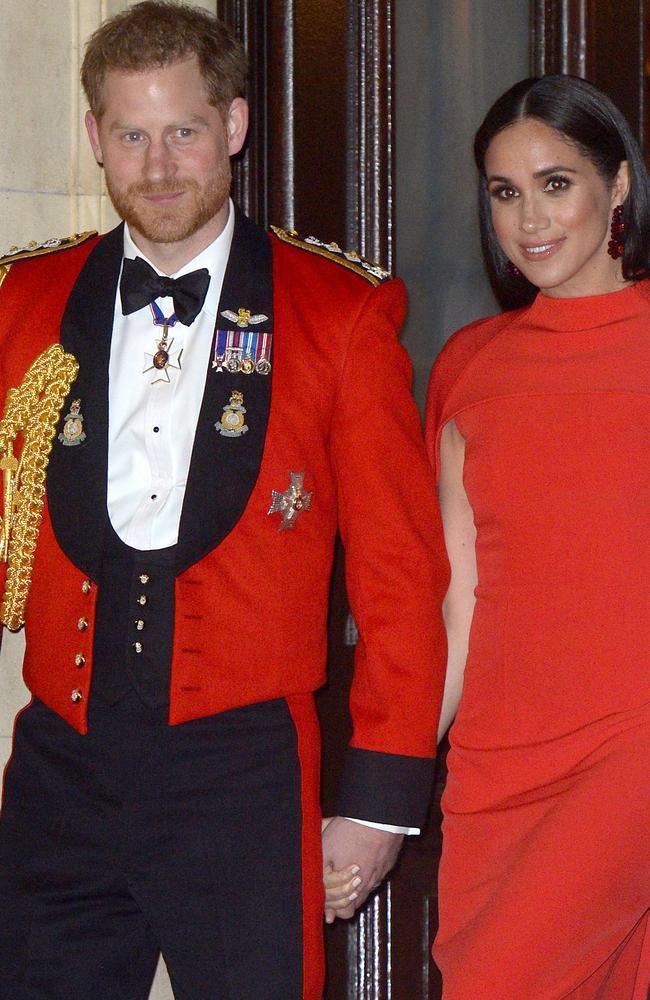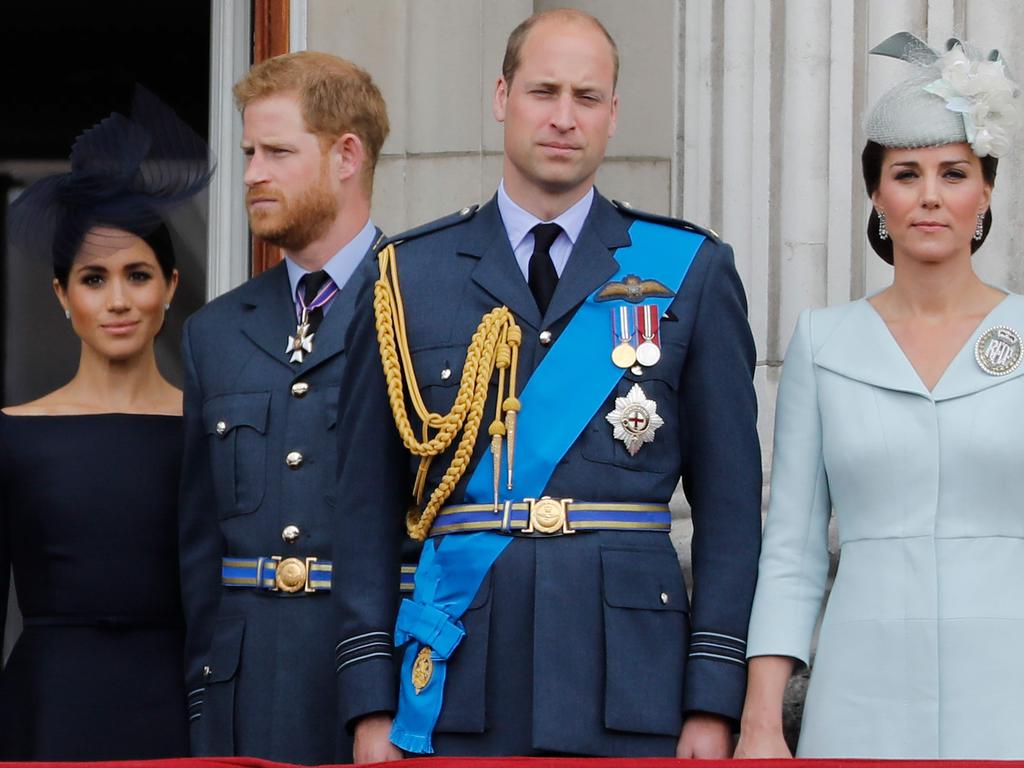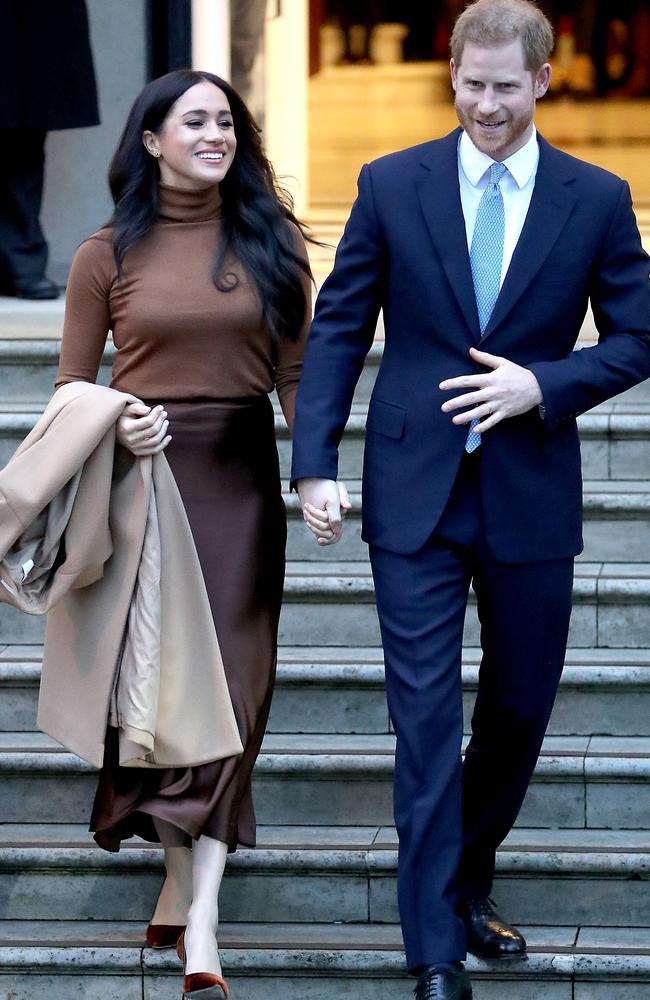Century’s old rule that could see Prince Harry return to the UK after move
With the Duke and Duchess of Sussex holed up at their new home in California, a little-known rule could pull Harry back to London.
When the clock ticks over from March 31st to April 1 next week, there will be no fireworks, no flags raised or lowered and no 41-gun salute to mark what is a historic moment in the annals of the Windsors.
Silently and inexorably while we sleep that night, Harry and Meghan the Duke and Duchess of Sussex will officially transition from senior, working members of the royal family to being titled 30-somethings who just happen to be related to the Queen.
It is a move several tortured months in the making. For much of January and February, Harry and Meghan existed in the eye of a media storm with shock announcements, royal summits and emotional public speeches as they and the Queen bashed out the details of their exit.
Come the end of February, Harry and Meghan returned to London for their final series of engagements, their farewell tour by turns dazzling and sombre.
On March 9, they walked out of Westminster Abbey hand-in-hand, and just like that, they waltzed off into the sunset (okay, Canada).
What was meant to come next seemed fairly obvious: They would wait out the days until they were officially released from the bonds of royaldom on April 1 after which point they would unveil whatever grand plan they have been beavering away on inside their borrowed $20 million hideaway.
RELATED: Meghan lands gig with Disney
RELATED: Royals share unseen photos

But just because you have an HRH in front of your name (even if you can’t use it as will soon be the case for Harry and Meghan) doesn’t mean your life hasn’t been up-ended by the horrifying global spread of COVID-19.
And, with things changing so rapidly and dramatically in the UK there is a possibility that a century-old constitutional curiosity could see Harry pulled back into the centre of royal life.
Let me explain.
In 1911, King George V created what are known as Counsellors of State. While the exact model for how this works was tweaked in 1937 after the abdication crisis, the idea is the same: If the Queen (or King) cannot undertake their official duties due to illness or because they are overseas, two or more Counsellors can be appointed to carry out some of the duties of the Sovereign such as signing documents, appointing judges, receiving new Ambassadors and preside over Privy Council meetings.
In fact, the last time the Queen appointed Counsellors of State was in 2015 when she went to Malta for the Commonwealth Heads of Government Meeting.
As per the current rules, the Counsellors of State have to be appointed from a specific group which is made up of the Queen’s husband and the first four people in the line of succession who are of the age of majority (in this instance 21). Thus the current roster of possible appointees is Prince Philip, Prince Charles, Prince William, Prince and the Duke of York.
All of which would have been a year ago, before coronavirus, car crash TV interviews and high-profile resignations because thanks to the turbulent, upsetting events of the last few weeks and year, there are some glaring issues with the Queen’s current crop of potential appointees.
To start with, UK Health Secretary Matt Hancock has said that all British people over the age of 70-years-old will be asked to self-isolate. Late last week the Queen (93) was moved to Windsor Castle where a smaller number of staff are tending to her, while Prince Philip (98) has been relocated from Wood Farm on the Sandringham estate to Windsor also.
Likewise, Prince Charles (71) and his wife Camilla Duchess of Cornwall (72) are holed up at Birkhall, their house on the Queen’s Balmoral estate in Scotland.
With the COVID-19 crisis likely to continue for weeks, or even months, these four members of the royal family are for all intents and purposes stuck in isolation behind royal walls.
Then there is the Duke of York, Prince Andrew who was forced to resign as a working member of the royal family after his car crash of a BBC interview late last year about his friendship with convicted sex offender Jeffrey Epstein. Given recent events, it seems highly unlikely he would be called upon to act as a Counsellor of State.

While the Queen is in fine fettle and remains in contact with her aides and the government via Skype and all manner of modern telecommunications, the reason Counsellors of State are appointed when she goes overseas is to provide a physical presence of the monarchy.
Given Her Majesty looks set to stay sequestered inside Windsor Castle walls, there is the possibility that she could look to her Counsellors of State to provide this while she is unable to.
And this is where we get to Harry because there needs to be a minimum of two Counsellors appointed. William would be a given and the next most obvious candidate would be none other than the Duke of Susex, giving rise to the possibility that he could be called on to return to the UK to fulfil this essential constitutional role.
(Yes, Harry may no longer be a working royal but still very much a contender, from a legal and logical standpoint, to be a Counsellor. He would become ineligible if there ever comes a day when he is no longer officially domiciled in the UK.)
There is a certain logic to this scenario too. Harry has proven his commitment to stepping up and doing his bit for his country when needs be, having done two tours on the frontline in Afghanistan.
Assuming there was a way for him to leave Canada and enter the UK, both countries which are currently on lockdown, I find it impossible to see that he would ever say no should the Queen and country call on him to serve in this capacity.
Interestingly, should the brothers end up as Counsellors of State, any decisions they would make they legally have to be in agreement which could be interesting given their rocky relationship of late.
(Another option in this situation would see Princess Beatrice, the next adult in the line of succession, added as a sixth Counsellor of State which could be done if parliament amended the Regency Act.)
Sure, this might only all be hypothetical but coronavirus has already breached Palace gates, with a Buckingham Palace aide testing positive while the Queen was still in residence.
And yes, the very notion of Counsellors of State might sound like nothing more than some sort of arcane monarchical hangover, they are a very necessary cog keeping the wheels of the British political system turning especially during such a time of uncertainty.

“There have been occasions when legislation urgently requires royal assent,” Craig Prescott, Centre for parliament and Public Law, The University of Winchester, has written. “There is a small, but genuine risk that the non-availability of Counsellors of State could impede the operation of the constitution.”
Should the royal family sail through the coronavirus crisis unaffected (fingers and toes crossed) this thorny issue will only become more urgent when Charles ascends the throne.
At that stage, Princess Beatrice would join the ranks of possible Counsellors and potentially her sister Eugenie. However, Prince George can’t be appointed until 2034, Princess Charlotte in 2036, and Prince Louis in 2039.
Harry and Meghan are currently holed up inside an unknown residence in California, Instagram posts seemingly their only outlet to support his home country as it suffers, thousands of kilometres away.
A lot is going to change before the world emerges from the scourge of COVID-19 and even the Sussexes aren’t immune.
Daniela Elser is a royal expert and writer with 15 years experience working with a number of Australia’s leading media titles




